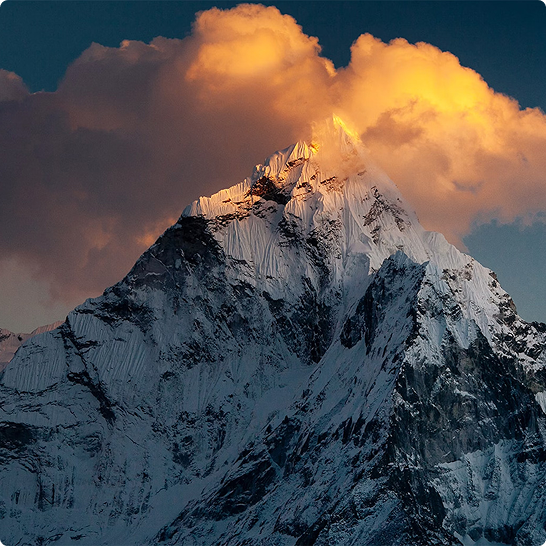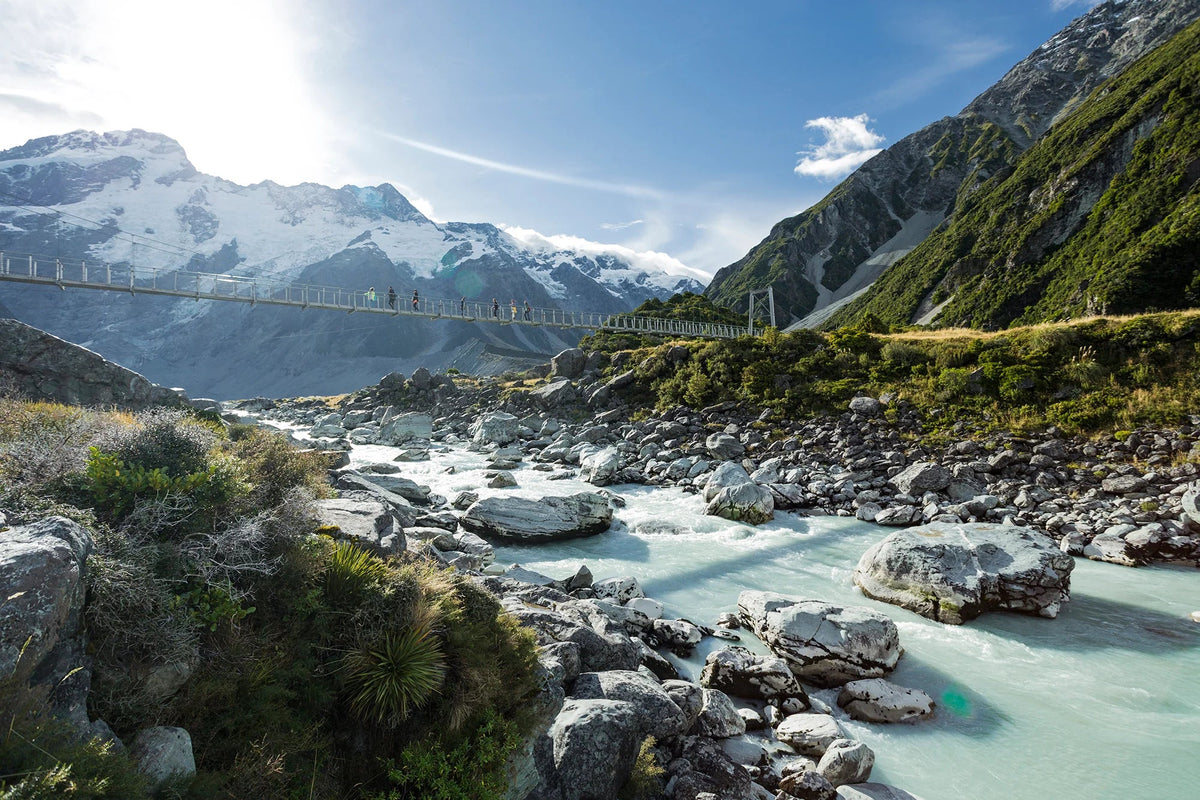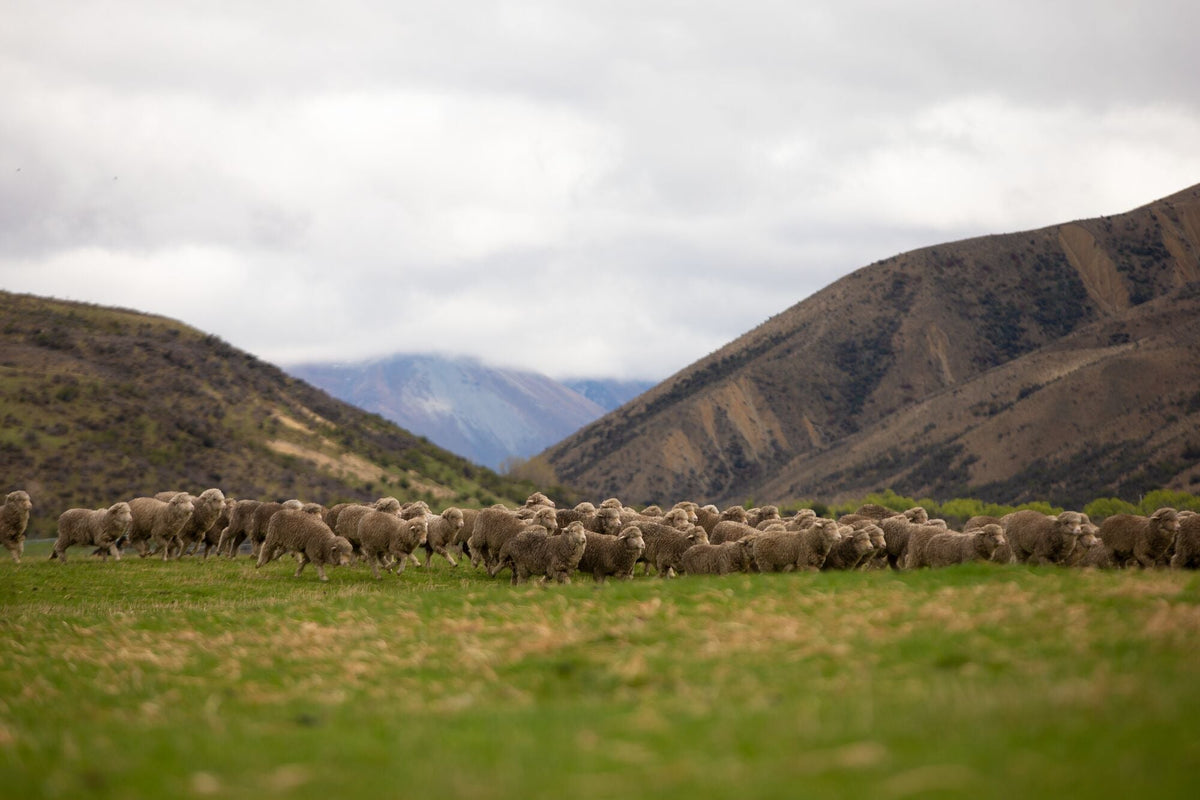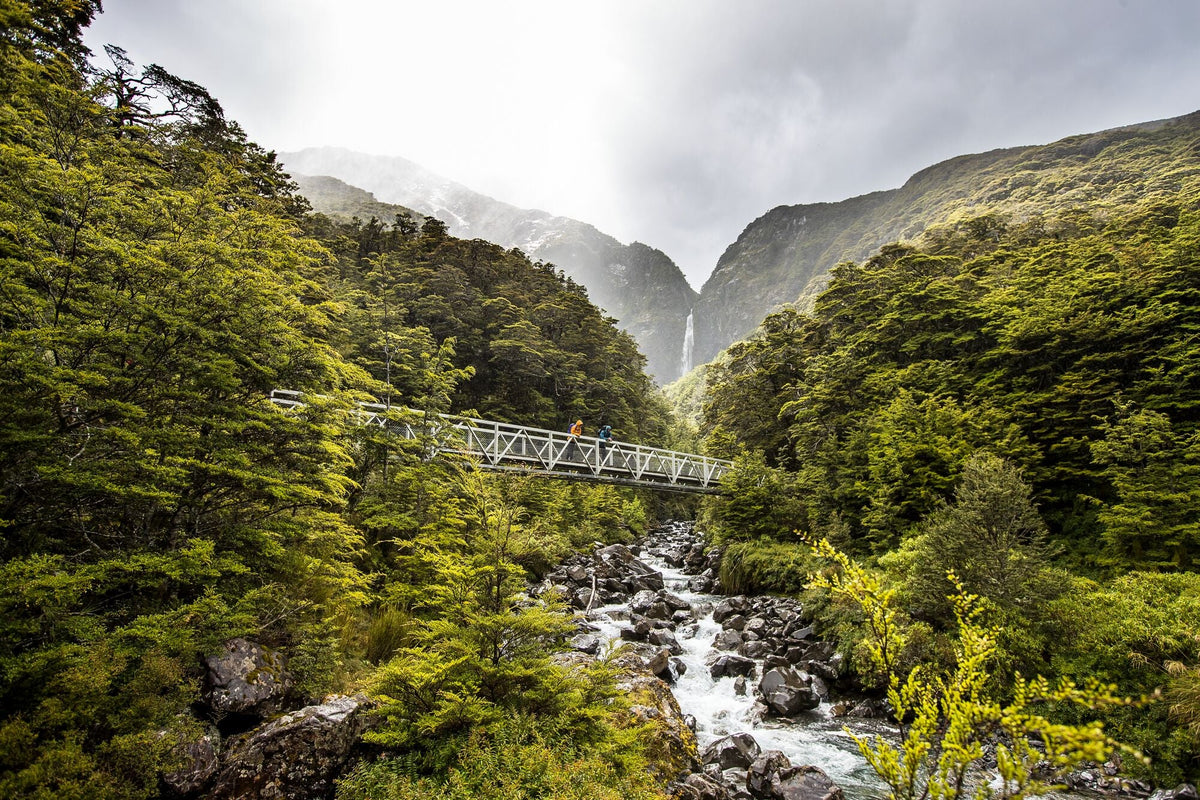Sustainable food production with Hamish Reid
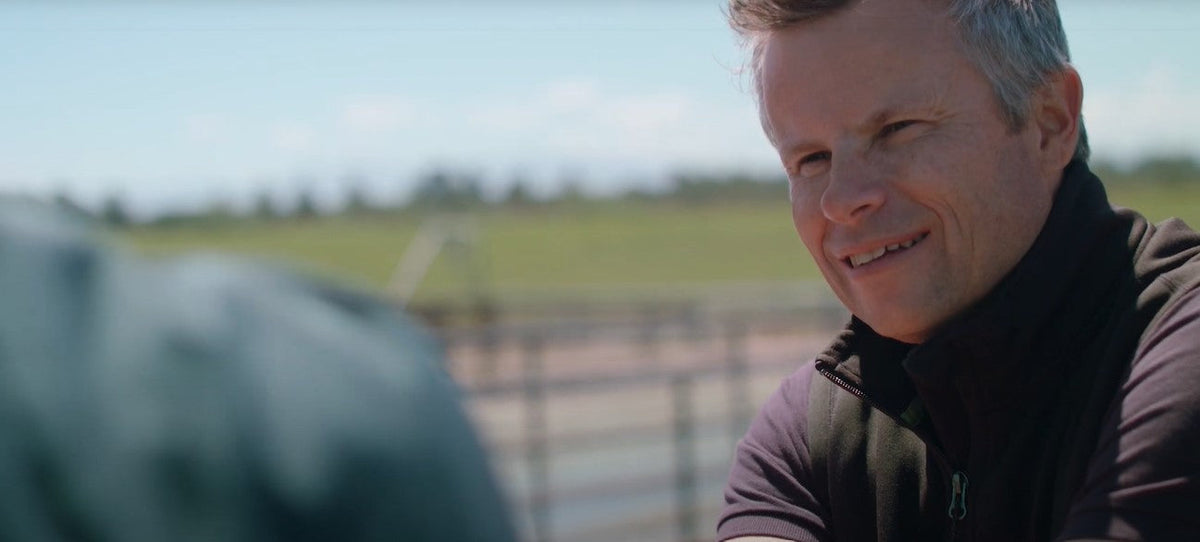
Hamish Reid is "Director - Sustainability and Brand" at Synlait. He takes the lead on developing Synlait’s strategy for sustainability with a particular focus on their aspiration to further improve the environmental and social performance from farm to fridge.
TRANSCRIPT:
Host: Sam Gash - 0:00
Hello everyone, you are here with me, Samantha Gash. I am here for the Kathmandu sustainability speaker series. We're going to be talking about food production. That industry Hamish has involvement with. My name is Samantha Gash. I'm a professional endurance athlete. I'm a social entrepreneur and I'm corporate presenter and what is kind of my passion is how do you intersect both endurance sports, social impact and storytelling, or for good. I love the kind of catchphrase adventure for good and I think you know, what people have is their footsteps of a certain skill set and they can use it to try and make the world a better place and to build small communities as well. And which is why it's my privilege to actually work with Kathmandu, who I've worked with on a number of projects over the years on bringing this series to life. And what we like to do in these sessions is discuss ideas and issues with a range of experts, enthusiasts in the field on key sustainability issues. And as I kind of touched on before, we've had people we've had ethically Kate, we've discussed modern day slavery with Kathmandu’s CSR manager, Gary Shaw, we've talked about beekeeping with Turia Pitt. And I love to hear that a couple of people went in the hunt to look for some bees afterwards to set that up. Laura Wells discussed how we can reduce ocean plastics. So, all these topics are actually about how we as consumers, and individuals can play our part. And to be more aware at how organisations are doing things around the world. So, Hamish that’s where you come in, because this is Hamish Reid everyone. You are the brand and sustainability director at the largest B Corp in New Zealand. Now, I want to get this pronunciation right. Synlait.
Guest: Hamish Reid - 5:54
Synlait, the French word for milk.
Host: Sam Gash - 5:58
Ah, it's a silent tea. I've got it now. Well, you have been involved in food production industry for a significant part of your career. And as opposed to me talking about what you've done, how about you kind of give an introduction and kind of talk about that journey that we discussed the other day, because I think it really helps people understand why someone becomes so passionate about what they do when they can kind of get the contextualization to their journey.
Guest: Hamish Reid - 6:27
Yeah, sure. Kia Ora. Thanks so much for having me, I'm really looking forward to sharing my view of the world when it comes to food production, and where we're at and what may lay ahead. So, I grew up on a farm. So, from a really young age, I was surrounded by food production. And after university, I joined companies in the food and beverage industry. And I've spent most of my life doing that, ever since. I did have a break really, after about 15 years of working on consumer goods marketing for big multinational companies, mostly in Europe. I ended up getting involved with the sport and music industry. And through a kind of a chance meeting with one of our clients, a guy called Michael Campbell, who had just won the US Open golf tournament, he started telling me about his deep spiritual feelings for the land that comes from his Māori culture. And that was like a spear through the chest moment for me. And I really then with Michael got deeply into understanding the big environmental challenges that we face and the implications of that and particular for the food industry really struck me. So, I soon after re-entered the food industry, and since then, sort of been my, my crusade, I guess you'd call it to really better understand how we might reshape, rethink about how we produce food and feed billions of people.
Host: Sam Gash - 8:13
I'm always intrigued and interested about that moment, when you kind of realise that maybe your directions should be in a different place. Whether it's like a meeting of someone who shares something, or it's a certain event in our life, like I think so many people have these moments. And it's really powerful when we're kind of brave and bold enough to actually follow that and see where it might lead us so and certainly let you in a really interesting path. So, this session here, we're going to obviously do a bit of a history about the food production industry. We're going to talk about the impacts of food production on our people and our planet and how the industry is adapting to new sustainable innovations and technology. And I'm also really interested to hear about any government initiatives that might be in play, how they're being received, and maybe room for growth as well. So, I hope people have checked out the video. It's obviously still on the Instagram profile page. So, if you haven't, you can go and check it out. But what I would say is we really love to answer questions about this topic that you might have throughout the session. So, don't hesitate to shoot a message through in the comment section below. And we will endeavour our best to get to it. You've been in the food production industry for many years. Can you kind of give me an understanding about how it kind of landed in the place that it is today?
WHY IS FOOD PRODUCTION SO UNSUSTAINABLE AND HOW DID WE GET HERE?
Guest: Hamish Reid - 9:38
Yeah, well, I stated in the intro film that the industrialization of the food system over the past 100 or so years has done a brilliant job of feeding billions more people all around the planet. Really cost effectively. Food is now cheaper than it ever has been in history. But it's come at a cost and environmental economists call those costs externalities. It's the things that you don't count, and the cost of making food. And, you know, they're pretty big. You know, I think something like 30% of global emissions, greenhouse gas emissions are created by the food industry. We don't count that in the cost of food that we manufacture and feed the people. The food industry uses up about 70% of the world's freshwater. We don't really count that as a cost. We're responsible for a huge amount of deforestation and biodiversity loss, and the degradation of soil and the degradation of water. So, all of these externalities, as, as they're referred to, aren't built into the cost of food. So, we've kind of gone blindly down this pathway of mass-producing food, without really a consciousness for the broader aspects of what harm that's causing. And it's not just environmental harm. It's harm to, you know, all species that we depend upon for life, actually, because the food system works in a symbiosis where all species, and all corners of the world all contribute to a healthy food system. And you know, we're killing a lot, a killing off a lot of those pieces that we are so depended on for life. But we're also not doing great in looking after ourselves. The way that we manufacture food and consume it, is creating the global pandemic of obesity, of diet related disease, of even respiratory issues amongst children. You know, there's all sorts of challenges that our food industry has really created unknowingly, to an extent. So many people are saying that big agriculture, not so much in this corner of the world and Aotearoa, New Zealand and Australia, but certainly in parts of the world, like in America, where they're saying that perhaps there's only 60 harvests of food left in certain parts of America, where so much of the food supply comes from. So, that is because the soils are so depleted. And they're so dependent upon synthetic inputs, for example, to be able to create that harvest year after year. You know, that, I think we're really seeing the end of food as we know it in certain parts of the world. It's probably not too late to turn that around. But certainly, in some parts of the world, you know, that farmland is, you know, almost abandonable before too long. There's nothing else to do with it.
Host: Sam Gash - 12:48
I mean, yeah, I want to talk about kind of break through the different areas where there has been costs through the industrialization of the food production, kind of like the ones you have outlaid now, but going even deeper. But to cut in first: is this widely talked about, like, particularly in relation to America. And the idea of 60 harvests left is that common knowledge?
IS THE IDEA OF 60 HARVESTS LEFT COMMON KNOWLEDGE?
Guest: Hamish Reid - 13:12
It's certainly not in the mainstream, I think more and more, so it's being understood. But it's still pretty fringy. But there's really strong movement in the right direction. And that's coming from, I think, really responsible businesses. So, there's, you know, hundreds of small business small food businesses around the world that have seen this and a pivoting towards it. So, they're building brands around more ethically produced food, for example. But also some of the big global multinationals, like our customers like Danone and Nestle. They see this revolution that's required. And it's got to be done soon, you know, next generation is too late. So, people are leaning into that. And there's more and more celebrity also, which is supporting the, the building awareness of these challenges. Woody Harrelson has just launched a great new film, I think it's called Kiss the ground, which is a really cool story about the regenerative agriculture movement. So, I think it's starting to build but it's far from the mainstream, and we need to get this consciousness into the mainstream if we're going to make progress quickly.
Host: Sam Gash - 14:28
I mean, it is quite impactful when you kind of give those types of numbers. It creates a sense of urgency to do what you can. So, if we break down to some of those costs, based on this, can we maybe talk about climate and the impact there?
WHAT IS THE IMPACT OF FOOD PRODUCTION ON CLIMATE CHANGE?
Guest: Hamish Reid - 14:46
Yeah, well, climate is really is the major issue of our generation. And as I mentioned, the food industry contributes so much to our warming climate. 30% of global emissions are generated by the food industry. That's either a direct result of food production and manufacture, or a secondary result. For example, a lot of greenhouse gas emissions are generated by producing grains to feed animals and feed lots which are being grown for beef, for example. So, that collectively is adding to climate change. 30%. I don't think there's a sector outside of food, which contributes more than that. The global aviation industry is tiny compared to food when it comes to climate impact.
Host: Sam Gash - 15:40
And we hear about aviation and transport all the time. But not about food production?
IS FOOD PRODUCTION WORSE THAN TRANSPORT AND AVIATION FOR CLIMATE CHANGE?
Guest: Hamish Reid - 15:47
So much of the world has been deforested for food production, particularly in Brazil. So, you know, forests sequester carbon from the atmosphere. So, when we fell huge expenses of the Amazon rainforest, to grow beef or crops for beef, not only are we creating emissions from those sources, but we're also reducing our planet's ability to sequester carbon from the atmosphere serve as a double hit there, which is pretty brutal. So, we really need to face them to the climate crisis in the food industry. And there's lots of great work going on. But we've got a lot of work to do to turn the ship around.
Host: Sam Gash - 16:28
Okay, then what about the impact to water?
WHAT IS THE IMPACT OF FOOD PRODUCTION ON OUR WATER?
Guest: Hamish Reid - 16:33
Yeah, water is the challenge. And it really depends on which part of the world we're talking about. In New Zealand, we have a water degradation issue. So, we don't really have a quantity of water issue like you perhaps do in Australia. There's plenty of water in New Zealand, it's not ideally distributed. And as our climate warms that distribution challenges going to be amplified, so parts of New Zealand will get drier, parts of New Zealand will get wetter. So, quantity isn't so much of a problem for us. But water quality is as we took synthetic fertilisers onto land. And if we don't do that in a really scientific controlled manner, those fertilisers seep through the soil into the bedrock and then into rivers. And that results in removing oxygen from those waterways. And that results in all sorts of problems which choke up waterways and the quality of that water gets deteriorated over time. So, that's the big issue that we need to face into. And we're making good progress. And we're really leaning into it. It's really salient topic for people in New Zealand. And it's really important for our social licence to operate, but we make quick improvements when it comes to water quality, and other parts in the world. Other parts of the world have their own issues, and some of them have water quality issues, and particularly in the developing world where they haven't got the systems and the regulations in place to protect waterways. So, it is being treated as sewers essentially for not only the agriculture industry, but for you know, for city development and general population growth. So, watter obviously, is the life giving force that we all depend upon, and it's something that we need to deeply protect. Māori language, Te reo Māori, water is referred to as the most precious town, most precious treasure. And we currently don't really value water as well as we should. So that's something we really need to work towards.
Host: Sam Gash - 18:47
I couldn't agree any more. When it comes to biodiversity, what are some of the impacts there?
WHAT IS THE IMPACT OF FOOD PRODUCTION ON BIODIVERSITY?
Guest: Hamish Reid - 18:57
Yeah, well, I mentioned it before that the food system works on a beautiful symbiosis that has been built up over millennia. And so, when one species is removed, by means of an activity, which has caused its extinction, or a foreign species is introduced into a local system that has a deep impact, everything is connected. So, we are at a bit of a crisis when it comes to species extinction. I forget the numbers, but it's horrendous. I think there's something like a million species currently on the endangered list. We are at a crisis point when it comes to rates of extinction. And the crazy thing is that we depend upon all of these species for our own survival. So, it really is by not protecting biodiversity we really are burning our furniture to keep ourselves warm. It's madness and it can't continue or there will be an abrupt end to life as we know it. You know, if bees disappear, we are in deep trouble. If worms and the bacteria in soils disappear, which they are rapidly, we are in deep trouble. We just won't be able to produce the food that we need to to feed the world.
Host: Sam Gash - 20:29
I mean, I think the way that you're explaining this is incredibly helpful, and you're making it make perfect sense so I just want to appreciate how you're sharing this information. Can we talk about human health? Which, you know, if all the other things don't seem to bother you human health maybe is one.
WHAT IS THE IMPACT OF FOOD PRODUCTION ON HUMAN HEALTH?
Guest: Hamish Reid - 20:48
Yeah, human health as well. I'm no expert. But, you know, we see what's going on when it comes to global obesity rates. It is an absolute pandemic and the numbers that are going to be involved with funding the healthcare system, particularly in countries like America, where something like 30% of children, I believe, under 12 years older, are classified is clinically obese. So, the cost to society, let alone the cost of those people's health, over the coming decades just to just to keep those people alive, it's just horrendous. And you know, that has just really come as a result of the food industry, you know, possibly not really knowing what it was we were creating. But then also by making food so cheap, by ignoring the externalities around the cost of producing it, and not passing those on to consumers. It gives manufacturers and food outlets and human consumers an excuse to waste food. In America think something like 30% of food purchase ends up in landfill. That is just crime, isn't it? And I know that, that when you think about this terrible calorie imbalance we have in the world where in America, they're throwing away 30% of food, because it's being bought, put on the fridge, and then it expires before it gets around to being eaten. Whereas there's still parts of the world where there's calorie deficiency, you know, there are a billion children in the world that that aren't fed sufficiently. So, there are some terrible injustices when it comes to human health. And the food industry has a lot to answer for that.
Host: Sam Gash - 22:48
Well, you've really clearly laid out the situation right now, and to kind of create some optimism around these issues and hope, because I think that's what people need to feel in order to make shifts as well, you need to know the problem, but you need to feel hope. Your video uses these words, like rethink and reimagine, which I think is really great, because it gives us a sense that there is still time to be able to significantly change the way that we do things with food production. Can you kind of break that down and just say some of the most important things that you're currently learning in this space?
HOW CAN FOOD PRODUCTION BECOME MORE SUSTAINABLE?
Guest: Hamish Reid - 23:27
Yeah, it's not too late. […] I’m really positive and optimistic about what is possible in the future. There's a lot that can be done to turn this around. But we do really need to move fast. You know, we haven't got, you know, more than a decade or two to fix this problem, because it'll be too late then. So, you know, there's some really great things going on. But I think central to that is really just relearning what we always knew. And it's only really in the last 100 years that we've created this problem for ourselves. Our grandparents, our great grandparents knew how to grow and nurture plants and animals more effectively in a symbiosis with nature, then twe certainly do these days. So, we need to kind of unlearn what we've learned and relearn what we've also always know. And there are some really great examples of, you know, reaching back into the knowledge of indigenous cultures like in Māori culture, there's some amazing knowledge of how Māori culture worked with the environment to feed people and in harmony with all other species. There were some mistakes made, of course, but people before even the agricultural revolution 12,000 years ago, lived much more effectively in harmony with nature to feed themselves. So going back to that thinking from 1000s of years ago, is really helpful in teaching us the forward ways of producing food. And that doesn't mean we need to go back to archaic systems. We can overlay those knowledge systems with modern technologies, and systems and understanding. And we can really use that to set up a system so that we will all prosper and flourish in the future and live healthier, more fulfilling lives.
Host: Sam Gash - 25:44
I'm imagining with this type of timeframe, the clock is ticking, and I presume the industry is moving in accordance with that. What are some of the changes that have been planned or even executed? And what's the positive effect that it's already starting to have? You know, on people and planet?
WHAT IS THE REGENERATIVE AGRICULTURE MOVEMENT?
Guest: Hamish Reid - 26:05
Yeah, there's some really great stuff happening. And it's happening all over the world. And I really, it's a bit of a catchphrase, and it means different things to different people. But the regenerative agriculture movement is huge. And it's gathering steam all the time. And every day, you know, there's more and more information out there about regenerative agriculture. […] The core notion of it is that it's about learning to farm in ways that no longer degrade, but create a farming system where people and planet regenerate and enhance and we're no longer extractive and destructive, where we're boosting ecosystems, while producing food, and feeding ourselves well. So regenerative agriculture is fascinating. There's been a lot of criticism around that it's not really based on science. But I think there's really building evidence around what the regenerative agriculture movement is doing on a scientific basis and it really starts with looking after soils. Soil along with sunlight and water are the three components that result in our food production system working and if our soils aren’t healthy and sequestering carbon and building organic matter if they've been destructed that’s when you are getting into the challenge of for example, just 60 harvests left before we aren’t able to use that sort of produce food. […]
Host: Sam Gash - 28:13
Can we talk about government initiatives for sustainable practices?
WHICH GOVERNMENT INITIATIVES FOR SUSTAINABLE PRACTICES ARE THERE?
Guest: Hamish Reid - 28:28
Yeah, no real complaints on the government support front, in New Zealand anyway. There's lots of investment going into research and better understanding what it is we're able to do what's within our reach to be able to turn around some of the big challenges we're facing. So, in New Zealand, we have some really good support mechanisms through our Ministry for Primary Industries. They're not funding just research institutes, but commercial organisations as well, that have ideas about how to fix up the food system. So, governments around the world are really leaning into this. Obviously, it's a pretty tragic result if populations end up starving because we're not able to make enough food to feed our people. So, you know, governments are really having to lean into this issue for sure.
Host: Sam Gash - 29:33
I mean, I'm presuming around the world with a differing level of emphasis on this. I mean, food issue is like a priority for pretty much every single country but I'm sure some companies have placed it as a greater priority. When it comes to this is the part of our sustainability session, which is very much focused on the consumer. So, for everyone listening right now, what are some of the things that we can look out for across the board to help make better food consumption decisions?
[…]



